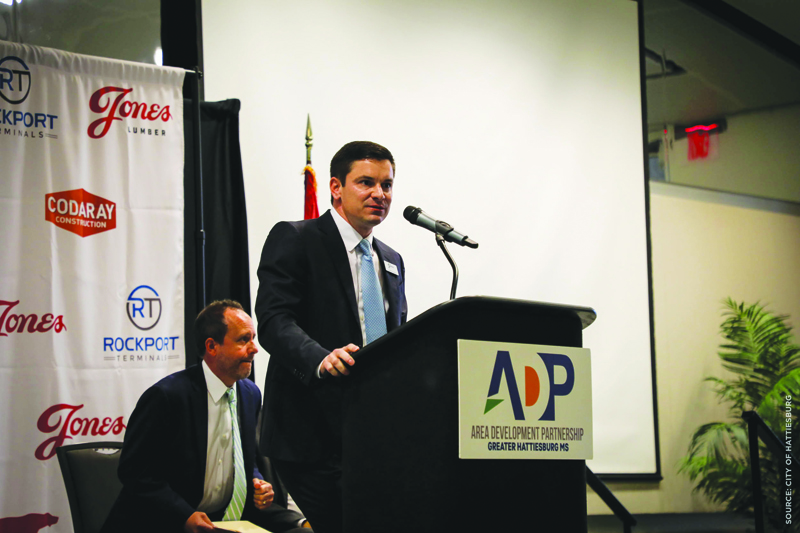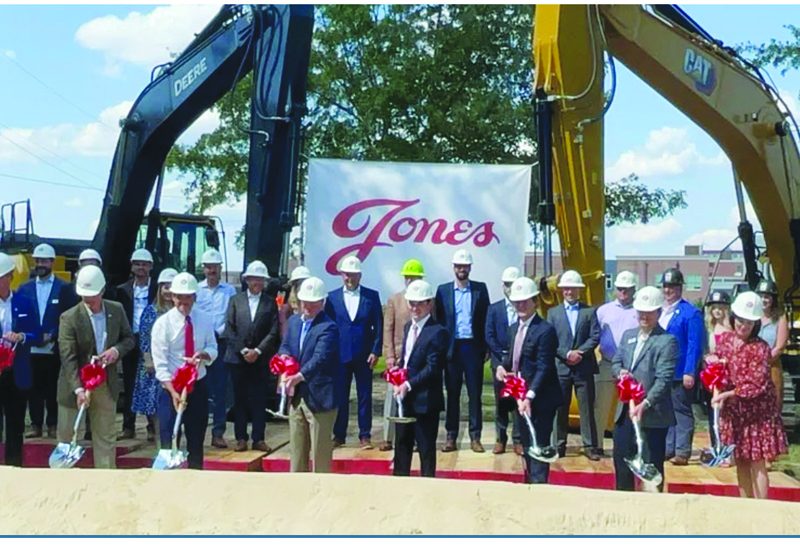Leads one of Mississippi’s most dynamic and promising companies
When Jonathan Jones was a young boy growing up in the Dexter community of Walthall County, he would hop on his four-wheeler for the short trek to the family’s sawmill and “play in the wood chips and sawdust pile … and just watch my dad and other foremen work.”
Jonathan, the younger of two sons born to Brett and Lisa Jones, developed a deep admiration early on for the hard work of his father and the individuals in the sawmill. Not only did he respect their hard work, but he also aspired to work within the company to expand and scale the organization.
“I admired my dad in so many ways and wanted to contribute in a manner that challenged me intellectually,” said Jones, CEO of Jones Capital, one of Mississippi’s most dynamic and promising companies.
“Even at eight or ten years old, I always wanted to work,” he said. “I wanted to see the world. I wanted to figure out how to continue to grow and expand the business.”
Jones’ mother, Lisa, valedictorian of her senior class, made sure her boys were “respectful, kind, had good manners, followed Christ, and got an education,” he said. “No one in my family had been to college.”
As an accounting major at Ole Miss, Jones drove shuttle buses to ballgames and toted luggage for opportunities to interact with successful alums.
When he received a D in an intermediate accounting course, he complained to Dr. Mark Wilder, now dean of the School of Accounting.
“He told me if I couldn’t find a way to get a C or better, then maybe accounting’s not for me,” recalled Jones. “I never failed another accounting class. It drove me to be more determined, more tenacious.”
After college graduation in 2004, Jones thought he would find work in Atlanta, Chicago, or Dallas. He’d nurtured friendships with one from Atlanta whose dad was a lawyer, and another from Fort Worth, whose dad was in real estate.
Instead, his father asked him to come home to help the family business through a rough patch.
“I think he really wanted to work with his sons,” joked Jones. “It was a rough 18 months. Through acts of God, business began to get better.”
The Genesis … and Turnaround
Lloyd Jones founded Jones Lumber Company in 1949, starting with a lumber mill built 200 yards from the family home and a simple mission statement Jones retains today: help communities, provide jobs, and enhance lives.
“My grandfather was a serial entrepreneur just trying to survive,” said Jones, noting his paternal great-grandparents were sharecroppers with a very small dairy and a small feed store. They produced cane syrup, a labor-intensive process that provided a small revenue stream.
“My grandfather built a career out of a poor upbringing, with a vast majority of work centered on wood products,” he said. “He was also a logger; built, bought, and sold small lumber mills; and bought and sold timberland.”
Unfortunately, after a prolonged illness, Jones’ grandfather died in 1999, when Jones was a high school student.
Watching his dad take over the business was impactful, Jones said.
Brett Jones created FV Recycling in Columbia, which is now one of the leading privately held paper recycling companies in the U.S. He started a ready-mix concrete business that Jeremy Jones, Jonathan’s brother, now runs as a separate business.
“My dad was a really good operator running the mechanical side of the business,” he said. “He was a self-taught engineer, self-taught electrician, machinist, and mechanic.”
During his time leading the various businesses, Brett Jones grew them from $4 million to $12 million in annual revenue.
As Jonathan became more involved with the business, he and his father quickly realized the potential in Dixie Mat. These were products his grandfather had pioneered in 1976 to be installed as temporary roads to allow heavy machinery to traverse otherwise inaccessible locales, such as crossing federally protected wetlands.
“He was taking timbers out of lumber mills that looked like railroad cross ties, and bolting them together,” he said.
Jones noticed that two-thirds of revenue from Dixie seemed to be tied up with brokers selling the mats. Jones also noticed the explosion of new natural gas pipeline activity in the early 2000s. He saw unlimited potential in the product line.
“My dad said go for it,” said Jones, who stopped using brokers and instead, established a commercial sales team in Houston, where most pipeline companies are based, to sell directly to customers.
Dixie Mat became Yak Access LLC, an umbrella company that included four construction matting and service companies—Yak Mat, New South, BluRoc, and Klein—and quickly grew into a leading North American matting solutions provider.
To build out the network, Yak bought a competitor in New England and merged with a competitor in Georgia. Another switch: Jones moved from selling to renting the product.
With more than 900 miles of temporary roadway on rent, Yak Access sold in 2018 to Platinum Equity in California. The timing of the sale was optimal as two years later, COVID hit, creating instability in the market. President Joe Biden, on his first day in office Jan. 20, 2021, shelved the 1,200-mile Keystone XL pipeline, shifting his strategy from oil-based to renewable power.
“I felt horrible for the new owner, but I had no way of knowing these things would happen,” he said. “Much of pipeline construction halted, but thankfully today, the business is back and doing very well.”
Gov. Tate Reeves handpicked Jones as one of five members on the executive team for the Governor’s Commission for Economic Recovery, to help advise him on how to rejuvenate the state’s economy in the aftermath of COVID.
Stumbling Blocks
For the first 15 years of his career, Jones spent 20 nights a month traveling to generate revenue outside Mississippi via sales, relationships, acquisitions, and growth. On one stretch, he visited 143 cities in 18 months, staying at a different Hampton Inn every night of the week.
“Business was at an all-time high, but I was 28 years old and divorced,” he said. “I was miserable.”
Around that time, Brett Jones retired, and Jeremy took over the concrete business and timberland. Jonathan Jones opted for company stock—and debt.
“At 30, I found myself with over a hundred million dollars in debt,” he said. “I was managing our logistics and paper recycling businesses when I started a portable storage venture. A few of my startups failed, but I learned valuable lessons from them. I remind myself often of Calvin Coolidge’s words, ‘Nothing in this world can take the place of persistence. Talent will not. Genius will not. Education will not. Persistence and determination alone are omnipotent. Success isn’t about being the smartest person in the room—it’s about showing up, doing the work, and refusing to quit when things get hard.’ I observed a common thread among the CEOs of those businesses. They didn’t fail due to a lack of hard work, ethics, or intelligence, but because of naivety.
“After college, I was incredibly naive from a business standpoint. One thing the tough times have taught me is to temper my naivety when it comes to business and people. Business success is directly correlated to the number of uncomfortable decisions you’re willing to make. Expanding into new markets, letting go of C players, and restructuring operations aren’t easy calls—but they’re necessary. Growth doesn’t happen by avoiding the tough calls—it happens because of them.”
It didn’t take long for his peers to notice Jones’ hard work. In 2009, he was named one of Mississippi Business Journal’s Top 40 Under 40. In 2016, he earned the prestigious Ernst and Young Entrepreneur of the Year for Diversified and Industrial Products.



A Clean Slate
After selling Yak Access, 2018 was a high point for Jones. He’d successfully sold the company and was essentially starting from scratch with the family business portfolio.
Instead, the year marked the second fairly dark time in his career.
“We had finally sold the business, but wealth alone didn’t bring me happiness,” he said. “Golfing every day isn’t what gives me joy. Of course, being with my family brings me joy. But business-wise, what do I enjoy in building a business? I enjoy constantly learning. Most of my learning has been from others who were willing to invest time in me and allow me to ask questions. I enjoy competing and pursuing excellence in business while helping others achieve success. With that reflection, I decided to champion compassionate capitalism.
“I’ve found that many leaders hold back on sharing sensitive information with their teams because they think it protects the company. But most of the time, it’s just a false sense of security. Sharing the vision—being honest and transparent—raises trust and buy-in. People want to know they’re part of something bigger, and transparency makes that happen.”
Jones pledged to reinvest at least 80 percent of the proceeds from the sale of Yak Access into job creation, focusing on being a growth-oriented and value-driven capital partner. His requirement for acquisitions: the companies must share his values and vision for long-term, sustainable growth to benefit all stakeholders—customers, communities, employees, and shareholders.
His investments cover a diverse range of middle-market operating companies and direct real estate investments.
By 2022, Jones was named the Boardman Distinguished Entrepreneur of the Year by the College of Business and Economic Development at The University of Southern Mississippi (USM). Specifically noted: Jones’ guidance, philosophies, and values that drive the company’s culture and strategy.
“He has an unstoppable entrepreneurial spirit, a strategic mindset and passionate vision, a record of impactful and impressive success, a steadfast commitment to innovation, and unquestionable integrity,” said Dr. Bret Becton, Dean of USM’s College of Business and Economic Development.
Deepening Roots
This month, Jones Capital is moving into a new $50 million headquarters in Hattiesburg, in a move that will also allow the company to work closely with USM.
The 80,000–square–foot building will pull together all its Mississippi–based companies—and some 250 employees—into a facility where each portfolio company has its own location.
“A lot of people have asked why I didn’t move all my operations to Houston, where there are more resources, and for me, it’s simple: Mississippi made me who I am,” he said. “I believe in giving back to the place that shaped me. It’s not only about creating jobs—it’s about building opportunities for the next generation, proving that world-class companies can thrive in Mississippi.”
The Jones Capital portfolio encompasses 11 directly controlled companies across industrial, infrastructure, and software sectors. Companies include Big Black River; Codaray Construction; Dark Horse Electric; Foundation AI; FV Recycling; Jones Logistics; Jones Lumber; Jones Power; PortaBull Storage; Rockport Terminals; and TRU Solutions. The company maintains approximately 50 investments of which it does not exercise control. In all, Jones Capital employs some 1,700 people worldwide.
“At Jones, we strive to hit a ‘single’ every day,” he told USM’s Van Arnold in 2022. “Our company appears to have grown rapidly, when in fact, we’ve just been disciplined toward growing a small amount every day and thankfully, seeing many of those ‘singles’ develop into doubles and even triples.”
To be more specific, Jones explained, “We’re very unconventional. We’re not a holding company. We have a smallish team of 15 people who spend their time acting as a bank and a board to all the companies we own. We reinvest the vast majority of our profits every year back into some sort of job creation.”
Jones Capital is not hindered by institutional capital in the form of pension funds or sovereign wealth funds that require a timeline by which capital must be returned. Most capital comes directly from Jones.
“One key distinction between us and most private equity firms is that we don’t acquire companies to flip or sell,” he said. “Our approach is to buy with the intention of holding them for the long term.”
Jones drives growth either by fostering organic development within its companies or by acquiring competitors. “For example, often, a competitor needs to retire and doesn’t have a succession plan,” he said.
Another method of growth or reinvesting: “If our current companies cannot absorb the capital responsibly, we’ll buy a new platform, a whole new business, potentially in an entirely different industry,” he said. Collectively, Jones Capital will do four to five acquisitions per year.
Jones considers discovering and mentoring entrepreneurs as the most important part of my job. “Our CEOs have lots of autonomy, yet we’re highly engaged with each one,” said Jones. “Most people claim they hire A players, but their insecurities hold them back from hiring someone who might outshine them. The truth is scalable businesses are built when leaders get comfortable surrounding themselves with people who are better than they are. And insecure managers? They’ll never hire A players, and they’ll never delegate—so their teams never grow.”
The Ole Miss Connection
In late October, Jones, 43, who sits on the UM Foundation Board of Directors, gifted Ole Miss with $10 million toward the construction of Jones Hall, a new $125 million, 100,000-square-foot academic home for the university’s Patterson School of Accountancy, to be constructed at the corner of University Avenue and Grove Loop.
“The naming is meaningful because the Patterson School is the No. 1 college program in Mississippi, and No. 8 in the nation,” said Jones. “We have a chance to strengthen the Patterson School, for it to be a shining light, the tip of the spear for the university’s national recognition.”
Jones didn’t stop there. He is currently working with university leadership to develop an investment banking curriculum to begin August 2026 at the projected Center for Investment Banking at Ole Miss.
“When graduates come out of this program, they’ll understand how to create scale in business through large capital formation, mergers and acquisitions, and other types of corporate finance. This program will work to take accounting and finance a step further,” he said.
The new educational program will allow Ole Miss to compete with the likes of Yale, Stanford, Harvard, Princeton, and Penn State. “This type of program doesn’t exist in the SEC, except for the University of Texas and an early-stage program at Auburn,” he said.
Jonathan Duhon and Tom Caughlin, partners at Jones Capital, are Ole Miss alumni and Kappa Sigma fraternity brothers of Jones. “The three of us have benefited from Ole Miss in more ways than we can count,” he said. Jones Capital also has a corporate office in Houston, where much of the leadership resides.
Jonathan Jones’ story isn’t just about building successful businesses—it’s about building a meaningful life rooted in faith, family, and helping others. His journey, marked by resilience and grit, reflects a commitment to creating something bigger than himself—something that will outlast him. For Jones, true success comes from investing in people, leading with integrity, and staying connected to community. His vision for the future isn’t growing companies—it’s about inspiring others to dream big, work hard, and make their mark in life. Jones said, “I’m most grateful for the struggles that turned out to be blessings in disguise.”


